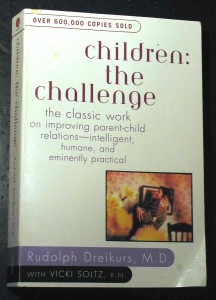Citizens act like dysfunctional children when kept ignorant of “natural consequences.”
In 1964, Rudolph Dreikurs wrote a child psychology book that is still considered a classic by child psychologist: Children: the Challenge. Dreikurs argued that using punishments to change behavior is inefficient.
No amount of punishment will bring about lasting submission. Confused and bewildered parents mistakenly hope that punishment will eventually bring results, without realizing that they are actually getting nowhere with their methods or, at best, they gain only temporary results from punishment. When the same punishment has to be repeated again and again, it should be obvious that it does not work. The use of punishment only helps the child to develop greater power of resistance in defiance.
Dreikurs argued that the authoritative idea of using punishment needs to be replaced with a sense of mutual respect and cooperation. Children need real leadership. “A good leader inspires and stimulates his followers into action that suits the situation.” It is important to arrange the learning situation such that a child learns “without a show of power, for power insights rebellion and defeats the purpose of child-raising.”
Dreikurs also cautions parents about using rewards:
The system of rewarding children for good behavior is as detrimental to their outlook as a system of punishment. The same lack of respect is shown. We “reward” our inferiors for favors or for good deeds. In a system of mutual respect among equals, a job is done because it needs doing, and the satisfaction, for the harmony of two people doing a job together…. satisfaction comes …


